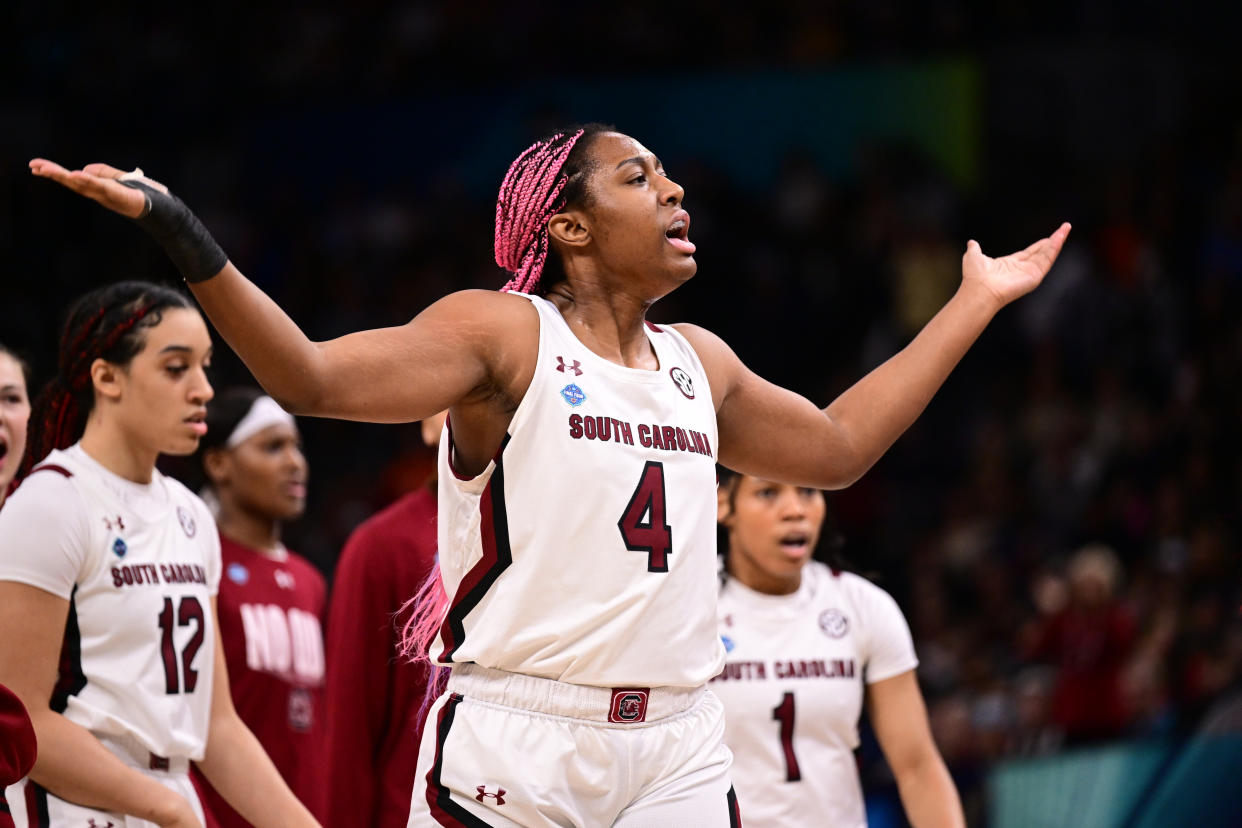Aliyah Boston's ESPYs snub exposes deeper problem with lack of exposure for Black female athletes

"I want to shed a light on Black women. They don't get the media coverage that they deserve. They've given so much to the sport, the community and society as a whole and their value is undeniable. I think it's time for change. Sports media holds the key to storylines. Sports media and sponsors tell us who is valuable, and you have told the world that I mattered today, and everyone who voted, thank you. But I think we should use this power together to also celebrate Black women." — UConn's Paige Bueckers during her 2021 ESPYs acceptance speech
After what has transpired over the past few days, it's hard to believe the people who run the ESPY Awards were paying attention to Bueckers' message. Either that or they're committed to proving how right she is.
One year after Bueckers took sports media and sponsors to task for continually overlooking Black female athletes after being named best athlete in women's college sports, nothing has changed. She gave the speech on ESPN — the network that broadcasts the women's Final Four and many other NCAA women's championships where Black women shine — including South Carolina star Aliyah Boston, the reigning Naismith National Player of the Year, Defensive Player of the Year and Most Outstanding Player of the women's NCAA Tournament who was nominated for the same ESPY this year.
And she wasn't even invited to be at the awards ceremony. Or more accurately, she wasn't invited until her head coach at South Carolina, Dawn Staley, brought attention to the snub on Twitter and an uproar ensued.
Like really….who in the room from @espn@ESPYS decided it was a great idea not to invite @MarchMadnessWBB NPOY DPOY….not one person was able to see the uproar this would cause? There’s definitely something wrong with the make up of the room……the fight continue….#WBBSTANDUP
— dawnstaley (@dawnstaley) July 17, 2022
Then, apparently, she was invited. Boston rightfully declined.
Boston's statement Wednesday on Twitter said,"It hurt more to see ESPN change course and invite me only after social media caught wind of it" than it did to learn the network wasn't going to air the category she was nominated for anyway. (There were nominees from other categories who also weren't invited.)
I thank God for continuing to bless me, for guiding my steps, and for the love and support of my family, fans and community. I would like to say congratulations @78jocelyn_alo and all the ESPY winners🎉 I remain thankful in all things. pic.twitter.com/BkO2iPA8YS
— Aliyah A. Boston (@aa_boston) July 20, 2022
There is no doubt Boston was the best player in her sport this past season, but the network that was all too happy to tout the impressive ratings it got for the NCAA women's Division I title game and say its commitment to women's basketball has "never been stronger" still couldn't see fit to make time for a collegiate woman to be celebrated on its stage.
What Boston wrote next resonated with many.
"I'm used to this. It's just another moment when the disrespect and erasure of Black women is brushed off as a 'mistake' or an 'oversight.' Another excuse for why our milestones and accomplishments aren't a 'priority' this time, even now, 50 years after Title IX."
I'm used to this.
The reality of that statement hurts the heart because Black women everywhere can relate to feeling overlooked and disrespected at work, of having their ideas ignored or flat-out stolen, of being minimized or dismissed, of being painted as "difficult" for speaking up or behaving the same way others do.
It doesn't matter if it's a Black woman working a minimum-wage job, completing her medical residency or, in Boston's case, becoming the most decorated college basketball player in the country. It's a constant struggle to be seen, to be appreciated, to be celebrated.
Fortunately, it seems Boston is getting a lot more support than derision online, including from her peers. Bueckers tweeted that Boston "[deserves] much better" and that "real & permanent change is needed, not temporary fixes to protect an image."
And at least one ESPN executive took notice. Just before the awards show broadcast began Wednesday night, Rob King, the network's executive editor-in-chief of special products, posted a setof tweets that said in part, "We hope to capture the progress of the women who continue to blaze trails and are committed to celebrating their stories, impact and forward movement... We also realize that there is still much work to be done and are unwavering about getting it right!"
That doesn't change what happened to Boston and the other young women nominated in her category, and it doesn't change that Boston got an invitation only when we found out she had been initially left out.
We've seen incremental improvement, especially since it has become clear that organizations like to tap Black women to clean up their hot messes (hello, Mavericks and Raiders), though given the long history of Black women being relegated to maids and mammies, a cynic might see that as changing very little beyond a pay raise.
We will keep working, keep fighting for respect for our mothers and sisters and girlfriends.
We will heed Boston's words:
"To every Black girl and every Black woman: You matter. You are valuable. You are a priority. You are seen and you are LOVED — don't let anyone tell you otherwise."
